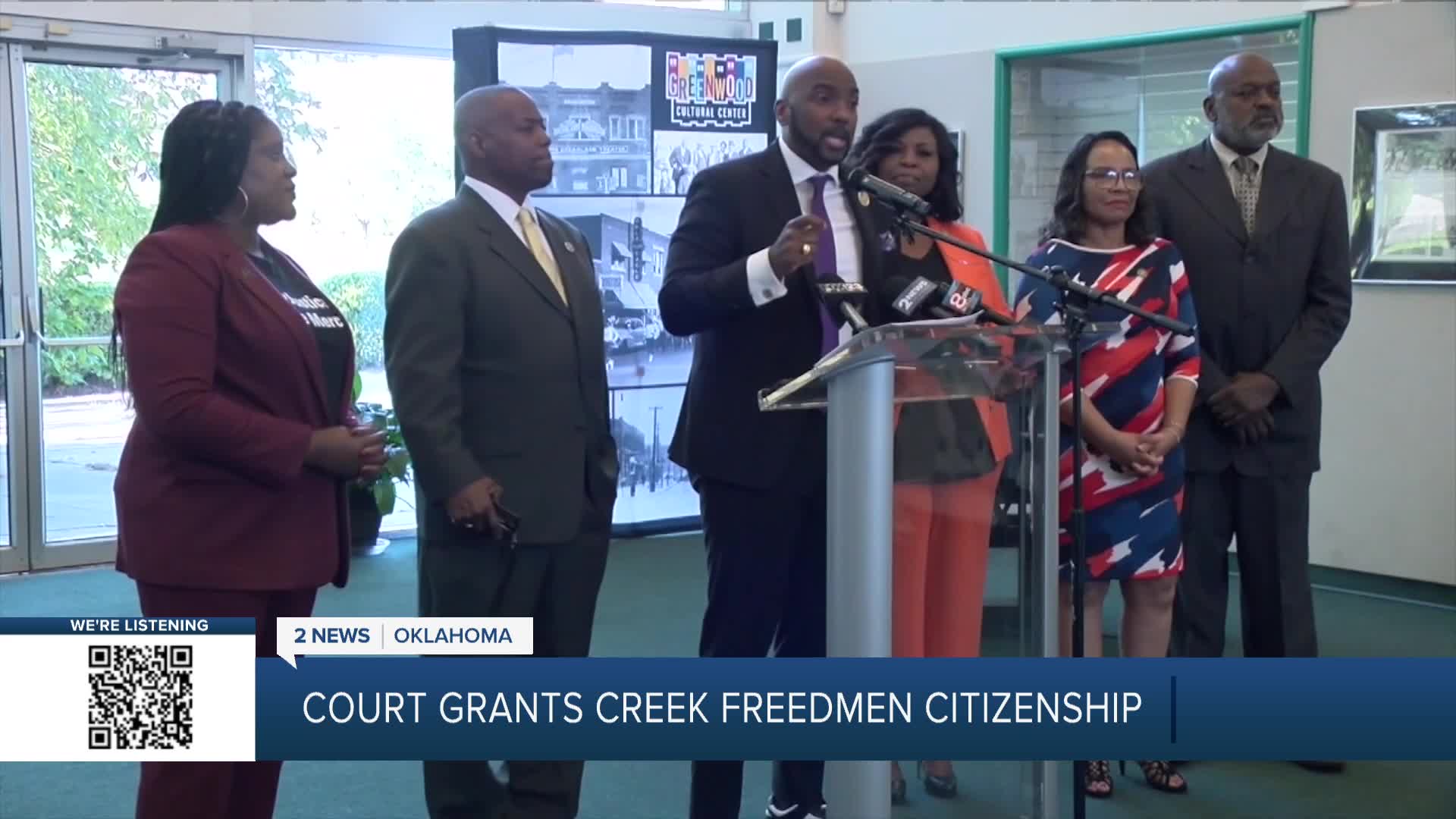OKMULGEE, Okla. — In a groundbreaking decision, the Muscogee Nation Supreme Court ruled that Creek Freedmen are tribal citizens.
“We can just go by the term of creek,” said Attorney Damario Solomon-Simmons. “Just let us be who we are.”
Attorney Damario Solomon-Simmons represents Rhonda Grayson and Jeff Kennedy.
WATCH: Muscogee Nation Supreme Court rules Freedmen are citizens
They applied for citizenship in 2019 but were denied because their relatives were on the Dawes Freedman Rolls instead of the Blood Rolls.
Their attorneys argued citizenship is guaranteed to the Freedmen through the Treaty of 1866 between the Muscogee Creek Nation and the US Government.
On July 23, the Muscogee Creek Nation Supreme Court agreed.
“I just appreciate the Supreme Court for looking at the law and applying the law as its written,” said Solomon-Simmons.
Solomon-Simmons has been at the center of this fight for years and it’s deeply personal for him.
“To know that when I was born, I was born a Creek citizen and now, because of this decision, I can now once again become a Creek citizen,” said Solomon-Simmons.
He says his great,great,great, great-grandfather helped negotiate the Treaty of 1866 between the Muscogee Nation and Federal Government. It grants citizenship to ‘Creeks of African Descent’ who were primarily the tribe’s enslaved people.
In 1979, the Muscogee Nation Constitution added a citizenship clause saying members had to have relatives on the ‘blood’ rolls.
46 years later, the Supreme Court Decision struck that down saying in part, “Are we, as a Nation, bound to treaty promises made so many years ago? Today, we answer in the affirmative because this is what Mvskoke law demands.”
“We want so badly for this era to be over with so we can reconcile with our nation,” said Solomon-Simmons.
The Supreme Court order removes the ‘by blood’ provision in the Muscogee constitution.
It requires the citizenship board to apply the Treaty of 1866 to Jeff and Rhonda’s case, granting them citizenship.
It also says also future applicants who can ‘establish a lineal descendant’ on the Dawes Rolls, either Freedmen or Blood, need to be approved as citizens.
“What does it mean that they made sure the next group is protected too,” asked 2 News’ Naomi Keitt?

“Well, it means two things. One it means that they understood the gravity of the situation,” said Solomon-Simmons. “Number two, it says this issue, again, can be behind all of us Black Creeks or Creek Freedmen and we can just go by the term of Creek. Just let us be who we are.”
Solomon-Simmons says the ruling upholds the Muscogee Nation’s sovereignty since the same treaty was used to justify the landmark McGirt ruling upholding tribal jurisdiction.
“They understood by protecting article two of this treaty, you protect the entire treaty.”
The decision would grant the Freedmen access to all the benefits of tribal members.
Solomon-Simmons says he plans to reach out to Principal Chief David Hill to see how they can start the reconciliation process.

Local News
Creek Freedmen citizenship case heads to MCN Supreme Court
In a decision filed today, the Muscogee Nation Supreme Court justices found:
"any reference to 'by blood' citizenship in the 1979 Muscogee (Creek) Nation Constitution to be unlawful and void ab initio. The matter is remanded to the Appellant, Citizenship Board, who is directed to apply the Treaty of 1866 and issue citizenship to the Respondents, and any other future applicant who is able to establish a lineal descendent on the Creek By Blood Dawes Roll, or the Creek Freedmen Dawes Roll."
Read their full 25-page decision —> HERE.
2 News reached out to the tribe for a statement about the decision:
We are currently reviewing the order to understand its basis as well as its implications for our processes. It may be necessary to ask for a reconsideration of this order to receive clarity so that we can ensure that we move forward in a legal, constitutional manner.
Lawyers for Grayson and Kennedy released a statement:
As Creek Freedmen, we’ve always carried the truth of who we are. Today, that truth was recognized. This decision affirms our place in the Nation—not as outsiders, but as citizens. We’re ready to walk forward together, guided by our elders, our communities, and our shared hope for what comes next.” — Attorney Damario Solomon-Simmons, lead counsel and descendant of Creek Freedmen.
Stay in touch with us anytime, anywhere --
- Download our free app for Apple, Android and Kindle devices.
- Sign up for daily newsletters emailed to you
- Like us on Facebook
- Follow us on Instagram
- Watch LIVE 24/7 on YouTube





